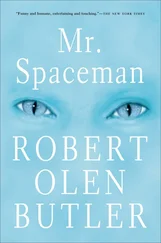He feels her face turn downward again.
Good.
Peggy Quinlan gently disengages her son’s arm from around her, raises the handkerchief she’s been fisting, and dabs at her eyes, wipes her nose.
She tucks the handkerchief into a pocket of her sweater.
Robert is still not looking at her. Not looking at the chair either. His eyes have drifted to a Currier and Ives print of a sleigh in the foreground of a snowy countryside, its pair of horses in a synchronized trot, the sleigh holding a mother and father and two children. This print has hung on his parents’ living room walls through his whole lifetime. Robert long ago stopped even seeing it. He sees it now. And he remembers that as a child he took the two children, bundled similarly, to be brothers. They are not. One is a girl.
“He loved you,” she says.
Damn.
Robert regards her. He wishes he could offer the reflex reassurance that has been so easy for the past half hour. Just one I know and she might refrain from making the case for William’s love. In the absence of any overt avowals from the man, Robert made his own faulty case for that over the years. Those tears in the bar, for instance. And none of it carries weight anymore. Not after yesterday. He tells himself: After yesterday I can’t lie about this even to say those two words.
But he considers the alternative.
She is brimming with bullshit reassurances.
“I know,” he says.
And he thinks: Fuck me. I’m your son. So there’s the lie we can agree to between us, so we can just go on.
She lays her head on his shoulder again.
She does not resume crying. Robert feels her working up to more words, though this intervening silence makes him hopeful they won’t be intended proofs of his father’s love for him.
But before she speaks there’s a knock at the door.
She rises and moves off.
Robert flexes the ache out of his mother-hugging arm, rolls the kink out of his shoulder. As his mother and his wife linger just inside the door to embrace and murmur, Robert rises from the sofa and steps to his father’s recliner. He looks for a moment at the man’s indent in the backrest and seat cushion. Then he lifts his foot and pushes the leg rest down till it snaps into place.
He cannot imagine how they will all get through the next several hours. But Darla squeezes Robert at the elbow and sits with Peggy on the sofa for a time, and soon enough things grow as much practical as mournful, seeing as William waits in the basement of Archbold. He needs a funeral home to carry him away and this leads to Peggy’s entreaty that they bury him in Tallahassee so that when she joins him they will both be nearer to Robert and Darla. This leads them to a choice of a funeral home and a cemetery and then to details of a wake and a service and then to a locating of Peggy’s desk copy of the will and of papers for insurance and Social Security and, in the process, the finding of a box of family photographs and the consequent reminiscences and criticisms cast as endearments and Peggy weeps some more and grows weary from weeping. Darla tucks her in for a late-afternoon nap while Robert wanders into the living room, weary himself. He stares at his father’s recliner and sees no reason why he shouldn’t sit there and put his feet up, but he finds no capacity to do so. And then Darla is beside him.
“Why don’t you go on home,” she says softly.
She puts her head against his shoulder. The same spot that has been occupied for a long while already on this day.
She says, “I suspect this is harder on you than you realize.”
He puts his arm around her, squeezes her gently, and lets go.
“I’ll work on her papers,” she says.
“Thanks,” he says.
“We need to make some calls.”
“Yes.”
“Shall I do them?”
“No. I’m fine.”
“Let’s divide up the close ones,” she says.
Robert nods.
Darla suggests she call their daughter and Robert their son.
He speaks what suddenly strikes him: “We’re getting to this late.”
“We needed some arrangements first so they could make plans.” Again she speaks softly.
She’s being patient with him.
Robert takes Darla in his arms, kisses her on the top of the head.
She turns her head, lays it on his chest, and exhales deeply.
She says, “In his own way, I’m sure he loved you.”
He makes himself wait for a few moments before ending the embrace so she won’t suspect anything is suddenly amiss. He thinks of something to say: “I really appreciate what you’re doing here.” And he goes out of the apartment and fumbles with the key in the door lock of his Mercedes.
On the Florida-Georgia Parkway he places a call to his son in Atlanta. Kevin’s voice sounds cheery on the answering machine. Robert simply asks him to call back. He hangs up. He turns his headlights on in the thickening twilight. He decides to stop at the New Leaf Co-op for a quick dinner.
Bob sits at an outside table in front of the New Leaf, watching the sky darken. He won’t let it sneak up on him this time, the dark. If it wants to come he will wait for it and he will own it. He is strong enough. Till a woman’s voice. Rushing by Bob, a woman talking rapidly on a cellphone, a fluttering jabber beating outward like something you’re planning to shoot, flushed from a plum thicket. Then she stops at the curb, invisible to him behind a support column on the arcade over the front of the co-op. She talks, she laughs, unseen. Laughs. Sapping him. Through a thin wall a woman’s talk, a woman’s laughter. Bob is fifteen. He is naked. Against this sound, from the past and from the present, he crosses his two arms before him at the wrists, pounds his chest once and again, hard, but the woman yammers on into her cellphone and Bob knows he can’t just get up and step out beside her on the curb to deal with her, he has to let her be and take care of it in his own head, and so he sings, he grabs a few words from the first song that comes to him and he sings them over and over— There’s something happening here —at first only inside his head but then they find their way into his mouth and into the chill of the dark, looping over and over There’s something happening here and the voice of the woman at the curb before the New Leaf abruptly moves off and fades away. The words slide back into Bob’s head. He listens outward while they play, and he realizes they can stop and he stops them.
All around, the darkness has taken over but he didn’t let it catch him off guard. He should go inside now. He has some coins. But he finds he cannot move. Somebody has turned the flame up inside the knot on his forehead. The pain has his full conscious attention, but inside him, coming upon him while he’s distracted, like the night overtaking the day, he is still fifteen but he’s not yet naked, it’s earlier in the evening and he’s staring at the flicker of the TV screen in the living room, and beyond the kitchen, at the far end of the single-wide, from behind the closed door of his parents’ bedroom, their two voices are grappling fiercely and then they stop and all that’s left is his mother weeping and now his father emerges and slams the door and Bob steels himself, waits for it all to turn against him. But his father stops in the kitchen, and beyond the thin wall his mother weeps on and Bob wants to go to her and try to help her stop, but his father is between him and the bedroom and so he stays where he is, keeping his eyes on the TV screen, seeing nothing. The refrigerator door opens and closes. A bottle cap hisses off and falls. And another.
And now Calvin looms over Bob. Bob keeps his eyes where they are. He braces himself. But the man simply stands there. Waiting. Bob looks up. Here , his father says. He’s holding two Blue Labels and he extends one of them to him. His father’s in that middle ground he sometimes can get into when he’s buzzing with beer and not hard stuff. His mother’s weeping has faded. Bob takes the beer, and as quick as that, he knows this is what he wants. His father sitting down in his chair nearby and the two of them drinking a beer together. It’s happened a couple of times before, and this is what Bob wants.
Читать дальше












